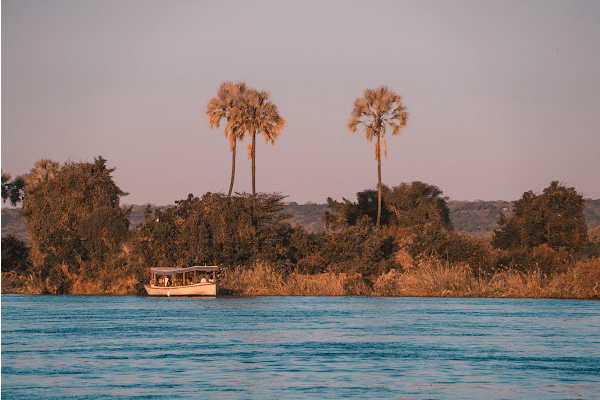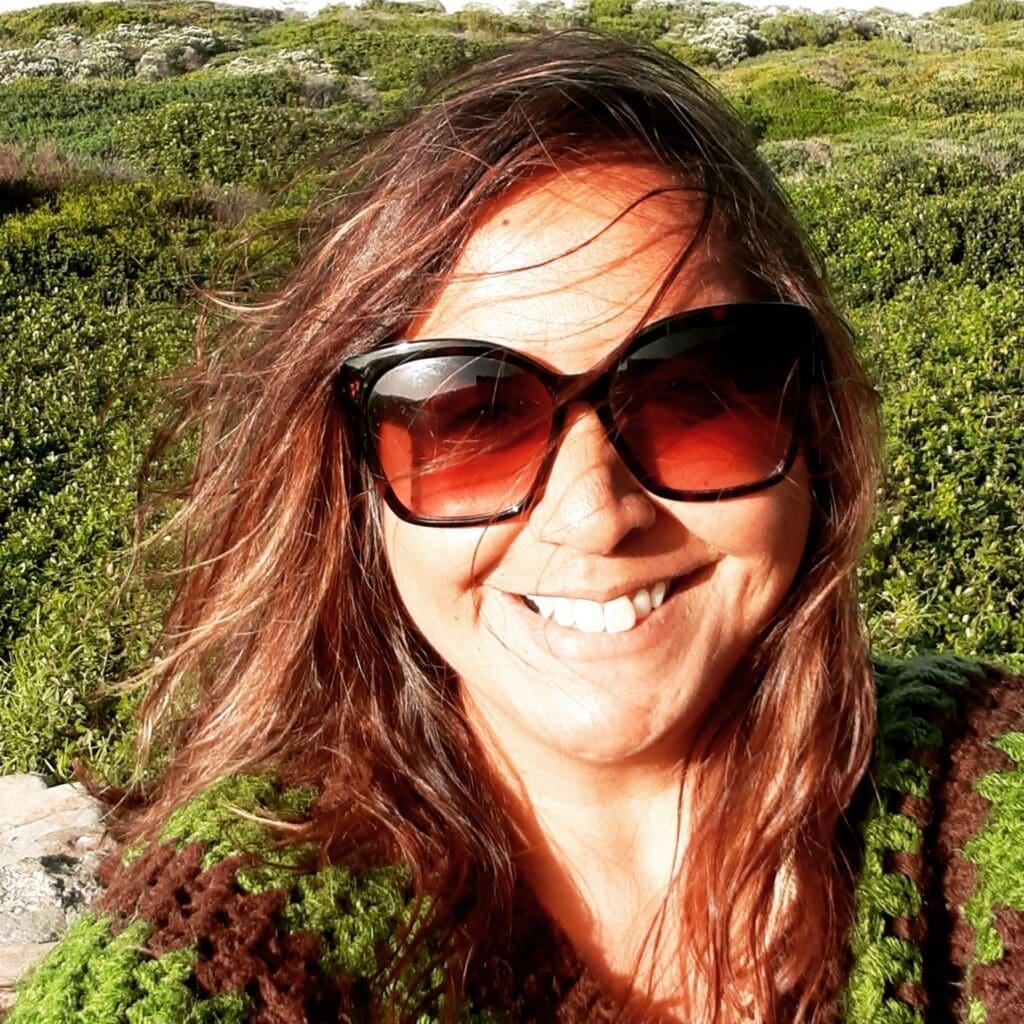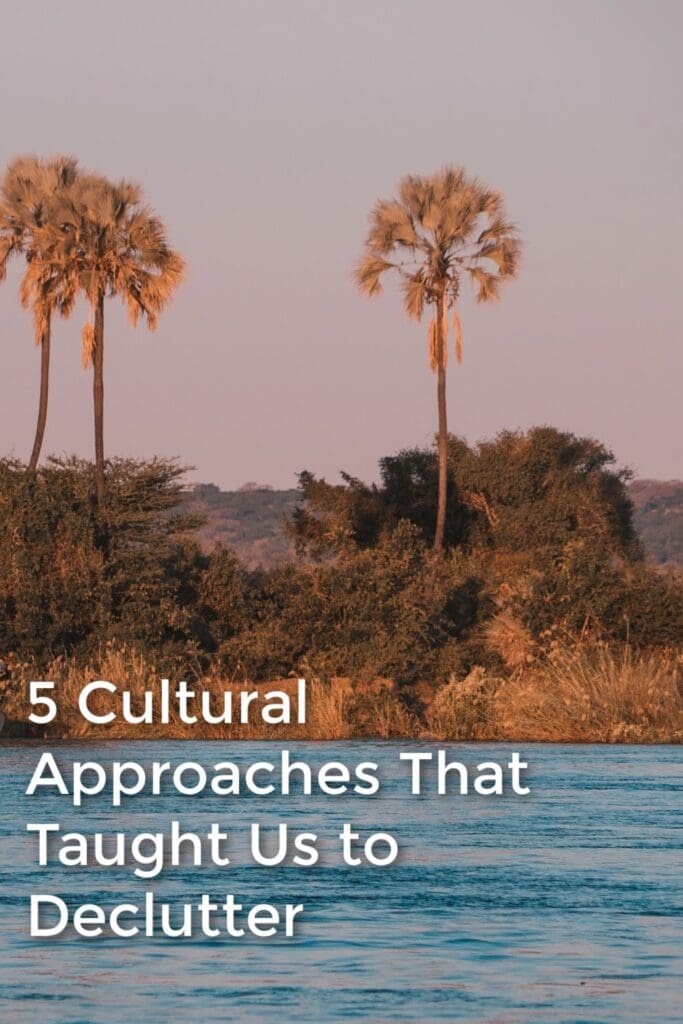5 Cultural Approaches That Taught Us to Declutter and Enjoy Living Simple

This is a guest post from Maggie at Mother City Time
So far this year, we’ve decluttered over 600 items. So why do we find it easy to let things go?
We worked in Education for an N.G.O. in Zambia and, later, in colleges, universities, and international schools. And while we were teaching, we were learning as well.
Lessons were learned from other cultures.
In addition, we’ve decluttered a lot, with each and every move.
For us, decluttering is about far more than marching unused items out of the house.
Decluttering is also getting rid of the norms that society tries to impose, losing the habits and values that stop you living life on your terms.
We live in a bonkers, brilliant world. Advertisers, business and so called ‘influencers’ encourage us to buy, buy, buy.
Surely, we must look beyond the bonkers, enjoy the brilliant, and use our heads.
We don’t need so much of what we’re encouraged to consume.
A joint decision was made early on. Our shared goal was to live debt-free and retire earlier than our 60s. ‘Get free sooner.’
We always budgeted to travel.
In Zambia and Kenya we learned to re-use many things. In both countries, as well as in the U.K, we knew that there were people living in poverty. Many will appreciate something that you decide to discard.
Japan was a reminder not to ‘keep up with the Joneses’ (sorry, Rachel). We found the level of competitiveness quite surreal.
My boss invited us on her yacht for a trip. Out on deck, she commanded her husband to moor next to a smaller model. He diligently complied with her wishes. She nudged me and giggled, “look, our yacht is bigger than that one”. She was consumed by her consumerism…big house, big yacht, big deal. She was probably one of the richest people I have ever met and was thoroughly unimpressive. She worked hard chasing material things and died young.
We made some unpretentious choices. We slept on the tatami mats provided rather than purchase ‘Western’ style beds. Household goods were bought from Y100 stores and then given away when we left.
In Dubai and Jakarta, the excess and luxury on offer re-affirmed what we didn’t want to spend our lives paying for. We worked hard, saved hard, and mostly avoided the shopping malls.
We recall having to buy two things for a rented apartment: a bed and a sofa. We bought good things that would last. We still have them now. A footstool arrived in a super-sturdy, oversized cardboard box. I taped the empty box shut, flipped it over, and covered it with fabric: An improvised coffee table. We didn’t have less friends because we didn’t have fancy furniture. We certainly didn’t have less fun. And when we were moving out, the cardboard box went for recycling.
Dubai’s monthly flea market enabled us to kit out the kitchen, and items were donated as we were leaving.
Time in Kenya reinforced lessons learned in Zambia. We cooked with locally produced groceries rather than imported ones. And we bought some unique, locally crafted items that we took with us when we left. We donated everything else.
And what of that goal?
We achieved it.
We are debt-free.
We walked away from work in our 40s.
Each year we celebrate our ‘Independence Day’. Last year, on our 5-year mark, I shared a post on social media. Amongst the encouraging and celebratory comments was one with a different tone. “That’s because you’re D.I.N.K s”. She explained; “Dual Income No Kids”.
It wasn’t that simple.
Being child-free was one choice. But there were many factors that enabled us to achieve our goal. How we look at material things has been key.
We’ve made some difficult decisions.
We did without many things.
During five years in Dubai, earning decent salaries, we never bought a car. We used taxis or rented cars that were handed back.
We mostly didn’t buy furniture. Sure, the furnished accommodation with some contracts wasn’t always of our choosing. But we got creative with artwork or fabrics and made a space feel like home.
I’d use work computers. I bought my first laptop when I was 48.
As we worked closer to achieving our goal, the question we would ask with any purchase was always the same: “Do we really need this?”
Just recently, a friend told my husband to buy a new bird book. He called a Blacksmith Lapwing a Plover. We won’t buy a new bird book. We’ll continue to use our ‘outdated’, second hand one. It will do.
After ten years of work in international schools, we bought a used car. We share it, look after it, and will use it indefinitely. We don’t need or want ‘his and hers’ cars or a newer, fancier model. We frequently use public transport.
I still happily update my wardrobe using thrift stores. It makes sense for budgeting and for our environment.
After years of simplifying things and decluttering temporary homes, many lessons stay with you.
We mostly deal in cash. Banks and businesses want you to ‘tap, tap’. But we know that for us, when you purchase things in cash, you think first and buy more carefully.
Our priority is still to keep traveling and experiencing as much of this wonderful world as we can while we can.
It’s often hard trying to live differently.
It can be harder still to explain why you chose to reject so much of what’s presented as normal.
But the alternative for us is less appealing: Working into your 60s to pay for a life lived in one place, with every gadget, every creature comfort, becoming more attached to what’s in your home than the world outside it.
For us it’s about the word success. That’s never been about climbing a so-called career ladder or material wealth.
Success for us is about living a life away from the BS of the rat race, having less, and doing more. It’s about living richly rather than having riches.
Sure, there will be a time when we’re spending more time in a comfy chair. When that day comes I don’t want to look at a room full of material things.
I want to reflect on a life full of experiences.
And that’s why we got rid of so much.
Maggie M

Maggie Miranda was born in London. She worked in Media Industries and then Film Education for over 30 years.
As an Educator, she moved with her partner to Zambia, where they trained teachers at a government college, earning a local allowance.
The experience was life-changing and the beginning of rejecting society’s definition of success and mindless consumerism.
After two years there, they left Southern Africa knowing that they wanted something other than the ‘work, consume, work more, consume more and retire old’ model on offer in most of the ‘developed’ world.
They went on to spend ten years working in international schools in the U.A.E, Kenya and Indonesia, with one clear goal; get free sooner.
Maggie and her husband retired in their 40s and now enjoy their life together ‘off the conveyor belt’ and chasing the sun.
You can find Maggie blogging at Mother City Time.

